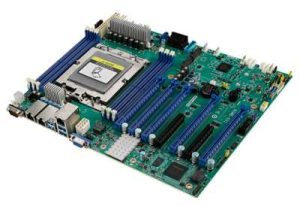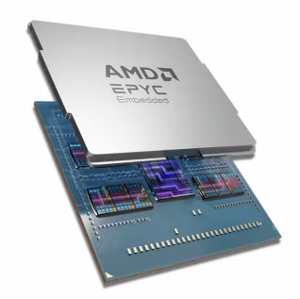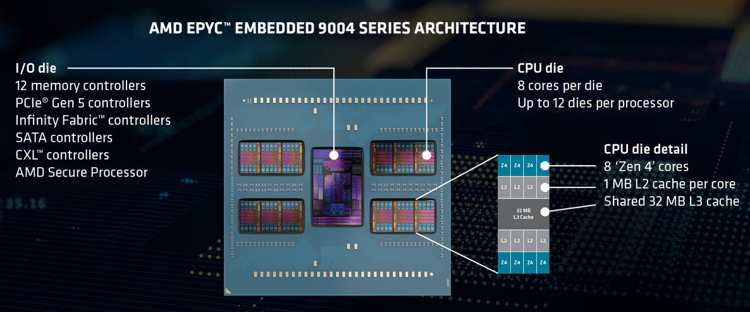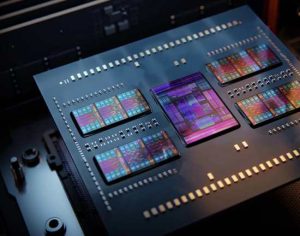Embedded World: AMD Brings 4th Gen EPYC Processors to Embedded Networking, Security, Storage and Industrial Systems
Combines embedded system-optimized features, enhanced security and scalability up to 96 cores, showcasing with Siemens and Advantech solutions.
This is a Press Release edited by StorageNewsletter.com on March 23, 2023 at 2:01 pmAt Embedded World, AMD (Advanced Micro Devices, Inc.) is bringing performance and energy efficiency to embedded systems with EPYC Embedded 9004 Series processors.
The 4th gen EPYC Embedded processors powered by ‘Zen 4’ architecture provide technology and features for embedded networking, security/firewall and storage systems in cloud and enterprise computing as well as industrial edge servers for the factory floor.
Built on the ‘Zen 4’ 5nm core, the processors combine speed and performance while helping reduce both overall system energy costs and TCO. The series is comprised of 10 processor models with performance options ranging from 16 to 96 cores, and a thermal design power (TDP) profile ranging from 200 to 400W. The performance and power scalability afforded with EPYC Embedded 9004 Series processors make them for embedded system OEMs expanding their product portfolios across a range of performance and pricing options. The EPYC Embedded 9004 Series processors also include security features to help minimize threats and maintain a secure compute environment from power-on to run time, making them for applications with enterprise-class performance and security needs.
“Supporting enterprise-grade reliability, AMD EPYC Embedded 9004 Series processors are targeted for heavy workload, ‘always-on’ embedded systems requiring exceptional compute performance and I/O agility in a power-optimized profile,” said Rajneesh Gaur, corporate VP and GM, embedded solutions group. “With the launch of the EPYC Embedded 9004 Series processors, we’re bringing the power of data center-level computing to embedded networking, security, storage and industrial applications.”
With EPYC Embedded 9004 Series processors, customers can create a variety of embedded networking, security, storage and industrial systems that operate in the most demanding conditions. EPYC Embedded 9004 offers performance and efficiency, enhanced data security features and unmatched core scalability of the EPYC 9004 Series server processor, while providing unique, embedded-specific benefits to help improve reliability and system longevity including:
-
Non-Transparent Bridging (NTB): Helps enhance system reliability by enabling data exchange between two redundant CPUs.
-
Non-Volatile Dual In-Line Memory Module (NVDIMM) (1): NVDIMM is a hybrid memory consisting of volatile DRAMs and non-volatile flash memory that helps retain data after a system power failure or reset by saving DRAM contents to flash.
-
Dual Serial Peripheral Interface (SPI): Enables 2 off-chip ROMs to be supported for secure boot.
-
Availability: Up to 7-year planned availability to address embedded requirements for long life and support.
Customer traction
Siemens and Advantech Co., Ltd. are among the lead OEM and ODM customers deploying the EPYC Embedded 9004 Series. The processors will also be deployed by customers in networking for next-gen firewalls and software-defined routers, as well as enterprise and cloud storage systems.
Siemens’ SIMATIC IPC RS-828A server is powered by the EPYC Embedded 9004 Series processors. The system is designed for HCI serving a range of applications, including automotive manufacturing, 5G base stations and IoT public clouds. The server can also be useful for applications involving AI or heavy computation, such as visual tracking in a retail environment.
“Siemens selected the AMD EPYC Embedded 9004 Series devices for our new high-performance, data center-class server because the processors reliably deliver performance and power efficiency while being able to operate seamlessly in extreme temperatures, as well as in settings with vibration or electromagnetic interference,” said Thibault de Assi, head, business line industrial computing, Siemens. “With AMD leadership in the data center, we have been able to leverage its exceptional expertise for our industrial-grade products, where performance and efficiency are paramount. The new processors will open new opportunities for the industrial market.”
Advantech’s ASMB-831 server board

Advantech’s ASMB-831 server board, with HPC-7420 4U rackmount, features 5 PCIe Gen5 x16 and 2 PCIe Gen5 x8 slots for 4 double-deck cards with DDR5 4800MHz RDIMM and up to 384GB (6 DIMMs). The ASMB-831 server board is designed to enable image analysis in various use cases, including industrial machine vision, AOI and facial recognition for smart city applications, and security surveillance.
EPYC Embedded 9004 Series processor overview
| OPN | Model | Cores | Nominal TDP (W) | cTDP (W) | Base Freq (GHz) |
Max Freq (GHz) |
| 100-000000921 | 9654 | 96 |
360 |
320-400 | 2.4 | 3.7 |
| 100-000000912 | 9554 | 64 | 360 | 320-400 | 3.1 |
3.75 |
| 100-000000913 |
9454 |
48 |
290 |
240-300 | 2.75 |
3.8 |
| 100-000000914 |
9354 |
32 |
280 | 240-300 | 3.25 |
3.8 |
| 100-000000915 | 9254 |
24 |
200 |
200-240 | 2.9 |
4.15 |
| 100-000000916 |
9124 |
16 |
200 |
200-240 | 3.0 |
3.7 |
| 100-000000917 |
9654P | 96 |
360 |
320-400 | 2.4 |
3.7 |
| 100-000000918 | 9554P | 64 |
360 |
320-400 | 3.1 |
3.75 |
| 100-000000919 | 9454P | 48 |
290 |
240-300 | 2.75 |
3.8 |
| 100-000000920 | 9354P | 32 |
280 |
240-300 | 3.25 |
3.8 |
The EPYC Embedded 9004 Series processors are sampling now with production shipments expected in April 2023. To accelerate development, evaluation kits featuring a reference board, documentation and development tool kits are available to qualified customers.
At Embedded World 2023, AMD will be showcasing its latest hardware and software innovations for embedded applications and markets. Product and solution demonstrations will feature the EPYC Embedded 9004 Series processors, Ryzen Embedded devices, Kria SOMs and Zynq and Versal adaptive SoCs powering industrial, vision, automotive and healthcare-based applications.
(1) NVDIMM feature availability dependent on ecosystem support
Resource:
Video
















 Subscribe to our free daily newsletter
Subscribe to our free daily newsletter

